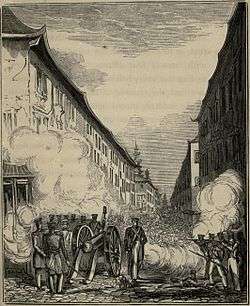Battle of Ningpo
| Battle of Ningpo | |||||||
|---|---|---|---|---|---|---|---|
| Part of the First Opium War | |||||||
 The British repulse the Chinese advance in the city | |||||||
| |||||||
| Belligerents | |||||||
|
| |||||||
| Commanders and leaders | |||||||
| Lieut. Colonel Morris[1] | Colonel Duan Yongfu[2] | ||||||
| Strength | |||||||
| 900 troops[3] | 5,000 troops[4] | ||||||
| Casualties and losses | |||||||
| 5 wounded[5] |
500–600 killed[4] 39 captured[4] | ||||||
The Battle of Ningpo was fought between British and Chinese Manchu forces in Ningpo (Ningbo), Zhejiang province, China, on 10 March 1842 during the First Opium War (1839–1842). After the British captured Chinhai (Zhenhai) on 10 October 1841, three days later they captured the nearby city of Ningpo unopposed. On 10 March, the Chinese dispatched Manchu Prince Yijing to muster forces and recapture the city but the British repelled their attack. The Chinese forces consisted of Manchu Bannermen. Tricked into thinking the British had abandoned the city, the Chinese rushed in only to find mines laid in the streets. The Chinese retreated but were ambushed by the British who achieved a decisive victory.
Notes
References
- Bulletins of State Intelligence. Westminster: F. Watts. 1842.
- Hall, William Hutcheon; Bernard, William Dallas (1846). The Nemesis in China (3rd ed.). London: Henry Colburn.
- Ouchterlony, John (1844). The Chinese War. London: Saunders and Otley.
- Waley, Arthur (1958). The Opium War Through Chinese Eyes. London: George Allen & Unwin. ISBN 0-04-951012-6.
This article is issued from Wikipedia - version of the 8/12/2016. The text is available under the Creative Commons Attribution/Share Alike but additional terms may apply for the media files.